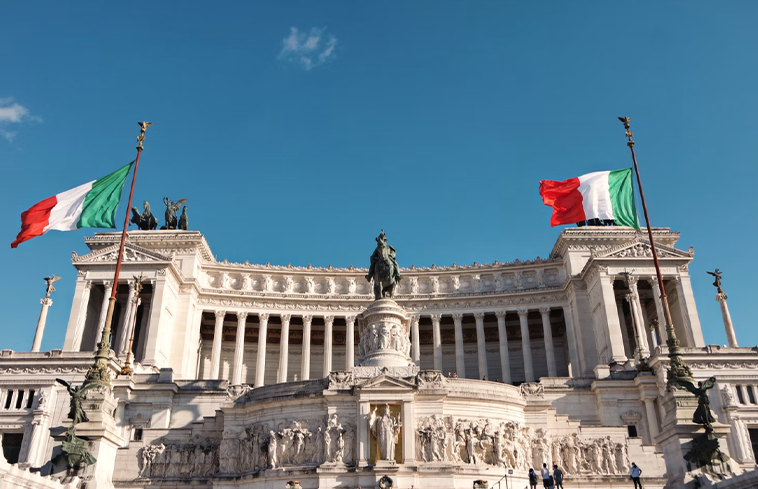Italians May Vote for Cannabis Decriminalization Next Year

Italian pro-cannabis activists have revived a new green wave that may change the cannabis consumption scenario in the country.
In only one week, more than 500.000 people have signed for the referendum campaign. Such success lies in two reasons. Firstly, the lack of political action to decriminalize cannabis has triggered cannabis enthusiasts to launch a referendum campaign.
Secondly, the recent introduction of digital signatures has simplified the bureaucratic procedures allowing Italian citizens to sign online instead of taking to the streets.
The Italian Constitution allows the citizen to lunch an abrogative referendum if they gain at least 500.000 signatures.
However, the referendum campaign has to pass several steps. When referendum promoters gain all the necessary signatures, Italy’s Supreme Court of Cassation verifies the signatures’ validity. Later, the Constitutional Court ensures that the referendum question is in line with the Italian Constitution. If all signatures needed are correctly validated, and the referendum question has been confirmed to adhere to the Italian Constitution, the President of the Italian Republic issues a decree setting up the date of the referendum. Italian citizens will vote ‘Yes’ or ‘No’ for removing the articles of the current narcotics law, which criminalizes cannabis cultivation for personal use. Furthermore, the referendum will end the administrative penalties for personal possession.
After several bureaucratic issues that undermined the referendum campaign, promoters now have to wait for the Supreme Court of Cassation and Constitutional Court’s verdicts. If all signatures are correctly validated, and the referendum question has no constitutional issues, Italians will be called to decide on the future of cannabis consumption in Italy.
This referendum won’t legalize cannabis, meant for regulating the cannabis market, and it aims to decriminalize cannabis cultivation at home and cancel any penalties over personal use. Currently, growing cannabis at home is a crime and sentenced with imprisonment.
Consuming cannabis for personal use is not more a crime, but consumers can be subjected to administrative sanctions if caught with cannabis. Italian pro-cannabis community has tried several times to end cannabis prohibition as the public debate over cannabis legalization dates back to the 70s.In 1993, a referendum promoted by the Italian Radical Party led by Marco Pannella successfully decriminalized criminal penalties for the personal use of cannabis.
The political class has always politicized cannabis legislation. Such politicization has polarised the debate over legalization, which turned to be based more on outdated ideology than on evidence. Right-wing parties consider cannabis the same ways as hard drugs, and they have enacted stringent drug policies against consumers over the years. Left-wing parties’ approach over cannabis instead has been bumbling. While minor left-wing parties support cannabis decriminalization and legalization, the Democratic Party, the largest left-wing party in Italy, has recently become reluctant to open a public debate over cannabis.In the last few years, the minor left-wing and anti-establishment party ‘Five Star Movement’ members proposed several draft bills to decriminalize or legalize cannabis. However, none of them has taken any steps fur ther.
The political inaction over the demand for decriminalization has been replaced with the popular initiative through the referendum. A positive result of the referendum on cannabis decriminalization would solve several problems created by the current prohibition policy.
First of all, cannabis decriminalization would allow people to cultivate cannabis at home without any legal issues. Such a breakthrough may have two positive aspects. The burden of cannabis-related crimes would weigh significantly less on the judiciary system.
Every year, thousands of people face trials for have been growing a few cannabis plants at home. As a result, these procedures slow down the judiciary’s work and squander the resources of law enforcement agencies. Secondly, decriminalization of domestic cultivation would allow people to consume a controlled product.
Buying cannabis from the black market may be risky not only due to legal reasons, and illicit cannabis products may affect public health. Indeed, cannabis flowers and resins are not controlled, so they may contain harmful substances that risk consumers’ health.
Regarding the cannabis consumers, a positive result of the referendum would cancel any administrative penalties. Although people will be able to grow cannabis at home, they can’t sell their products.
It is fundamental to notice that whoever sells cannabis grow at home will incur criminal offenses. Also, cannabis consumers can’t transform cannabis flowers, which means they can’t make any resins from the plants they cultivate at home. Furthermore, law enforcement agencies won’t revoke consumers’ driving licenses and licenses for particular jobs. Cannabis decriminalization would also have an indirect impact on society. For instance, Italian prisons will be decongested significantly as many convicted are there for cannabis-related crimes.
Furthermore, it would represent the first essential step to open a serious and realistic public debate over legalization, overcoming the polarised political debate. However, the path to get a referendum is still far from being achieved. At the time of this writing, promoters are sending all documents to the Supreme Court of Cassation. Political parties have yet to begin a solid debate over the referendum.
Furthermore, even if there will be a referendum next year, it must achieve a quorum to be valid. Most of the Italian citizens entitled to vote must take part in the referendum.A majority of yes’s must be reached so that the referendum decriminalizes cannabis cultivation and its possession.
In recent years, the turnout at the polls has decreased dramatically, and such a variable may invalidate strenuous efforts of the cannabis community to decriminalize cannabis.
Written and Published by Dario Sabaghi in Weed World Magazine issue 155















Please complete your information below to login.
Sign In
Create New Account